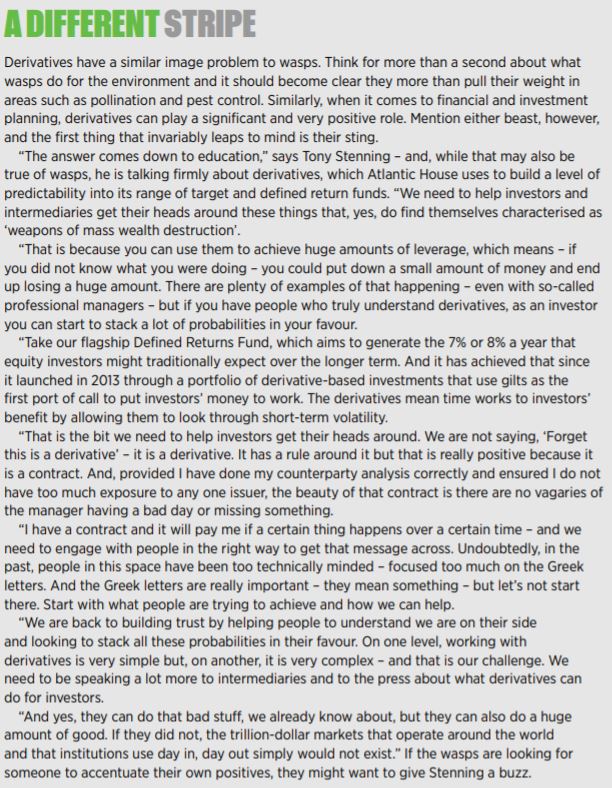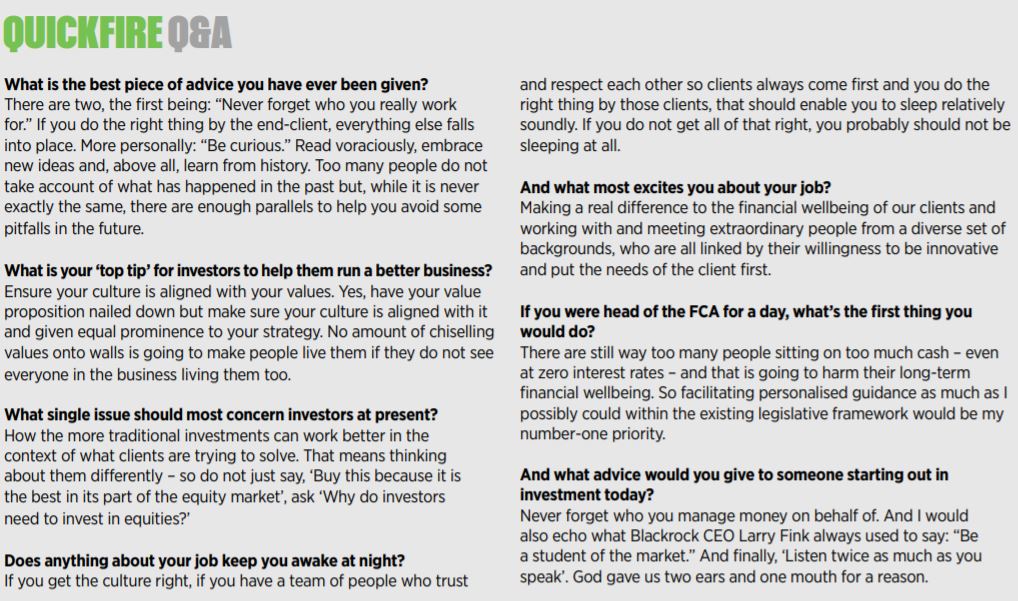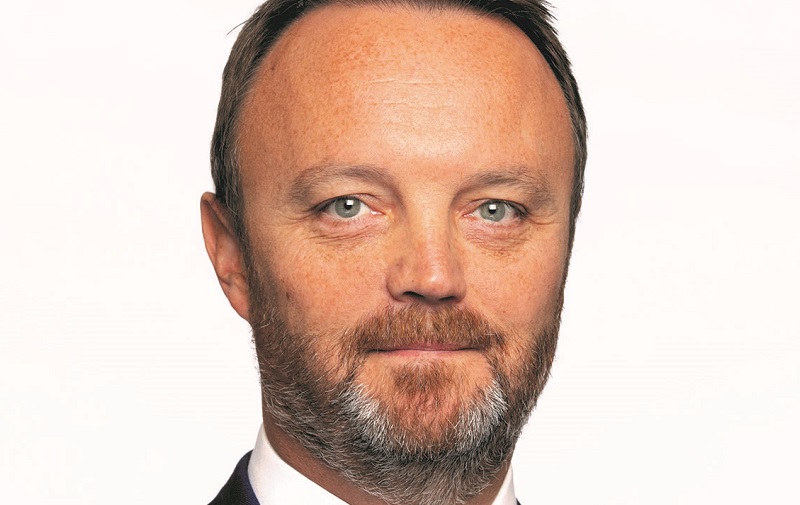The successful asset managers will be those able to help intermediaries hold the end-client’s hand for a longer part of the investment journey,” replies Tony Stenning, when asked how he would characterise the triangular relationship between these three parties.
“The intermediaries’ role in that piece, meanwhile, is migrating towards the ‘trusted adviser’ idea – helping people save for their life goals.
“Helping people manage their investments for the betterment of them and their family is an ongoing process that ultimately manifests as improved financial wellbeing.
“There are so many inputs here – building trust, education, helping people understand the plethora of confusing terms we probably overuse as an industry – but that can lead to better engagement with your and my generation, with our parents’ generation and with our children’s.”
Formerly head of UK retail at Blackrock, where he spent 16 years, Stenning became CEO of Atlantic House Investments and its parent company, derivatives specialist Catley Lakeman, in July 2020. And if his thinking on financial services can seem to come from a slightly different angle to his peers, that may be down to his involvement with The Investing and Saving Alliance (Tisa) for the past five years – the last two as chairman.
“People are sitting on a huge amount of cash at the moment and, if we can better engage individuals and so help them become more empowered, then they can make much more sensible decisions about what to do with that,” Stenning continues. “We might be able to mitigate some of the less sensible decisions too as there are clearly a number of people who are choosing to, as it were, ‘invest for entertainment’.
“And I get it – because the financial services sector is not necessarily engaging with them in the right way. They hear about cryptocurrency and non-fungible tokens and ‘meme stocks’ and they see videos on TikTok and Instagram about how they can make money quickly and, supposedly, pretty risk-free. Now, we know that is not the case but how do we tackle this? How do we help intermediaries hold the hand of their clients for longer?”
Advice vs guidance
As you might imagine, Stenning has some thoughts on the matter but, of course, the moment you start talking about asset managers and intermediaries helping consumers, you are treading the thin line between ‘advice’ and ‘guidance’ – the dreaded ‘regulation by thesaurus’.
“At Tisa, we are working with the Financial Conduct Authority and the Treasury on the future regulatory regime,” Stenning says. “The big question is how that might allow firms to personalise their guidance to consumers without transgressing this important regulatory hurdle of what constitutes advice but, actually, individuals are more interested in other big questions, aren’t they? They just want to know: how can I understand what I am investing in and what are the long-term benefits for me as an individual?”
Stenning points to the FCA’s own statistics, which suggest some 15.6 million UK adults have investible assets of £10,000 or more. Of these, 37% hold their assets entirely in cash, and a further 18% hold more than 75% in cash. Perhaps not unconnectedly, 54% of UK adults with £10,000 or more of investible assets – 8.4 million people – received no formal support to help them make investment decisions over the past 12 months.
“In the absence of any sort of help as to what might constitute appropriate alternatives, most people are just going to decide to leave everything in cash so at least they have it for that ‘rainy day’,” he argues. “The trouble is, we know they are actually losing that money steadily to inflation. They still have the same number of pounds but those pounds just do not buy what they used to – see any supermarket for details.”
‘Cash is king’ mentality
“This ‘cash is king’ mentality has always been a challenge for asset managers, but now we are seeing a chunk of cash migrating straight into that ‘investing for entertainment’ space and missing a key step in the progression. People are not being taken on an appropriate financial journey – possibly because they cannot afford it but possibly also because businesses are so scared of transgressing into this advice area.
“So the regulator has a key role to play in recalibrating that balance or else we will see a huge cohort of individuals saving – quite rightly – for their future but doing so in the wrong way because they do not know any better.
“And you cannot entirely blame them because we have not got our messaging right – and this is partly because, as an industry, we are so worried about being seen to personalise advice.”
Stenning believes potential solutions lie outside financial services, with Amazon – ‘Inspired by your purchase’, ‘More items to explore’ and so on – an obvious point of reference.
“The mentality here is that someone like you – not exactly like you – who bought something you bought, also bought something similar,” he says. “You might ignore the idea offered – a lot of people do ignore it – but you might also find it interesting.
“It is about firing and connecting synapses and the FCA can help here. Regulate us – absolutely – but help us connect with people and improve their financial wellbeing. That has to be a crucial area for the regulator: ensure markets are efficient and that the bad players are kept well away from the industry – but also make sure individuals are helped to obtain the appropriate kinds of investments for their financial future.”

Virtuous circle
Not that Stenning is suggesting asset managers should not also be taking a long, hard look at themselves – starting with ensuring they have the right internal culture.
“I cannot overstate the importance of culture,” he says. “It is, in effect, the glue that holds the entire asset management piece together – and the tone has to be set from the top. You need everyone fully buying into what any business is trying to achieve.
“If you do get the culture right, though, you will have people reacting with proper integrity and respect for everybody else and then clients become absolutely central to your decision-making. And, if you do the right thing by your clients, that builds the long-term foundation for your business. It also allows you to empower the people who work within the organisation, which leads to ‘responsible risk-taking’.
“By that I mean people taking responsibility for their own actions and making decisions for themselves, rather than continuously consulting senior management.
“And if you get all of those bits rights, you can build a firm whose values are aligned with staff and clients – one that recognises that, to earn the trust of clients, you first have to generate trust and respect among yourselves.
“At that point, you also create an environment where people are not afraid to speak up wherever they see questionable or unethical conduct and so it polices itself. If you can get that virtuous circle turning in the right way – and this is absolutely what we are trying to do at Atlantic House – then you have a real opportunity of not just talking the talk, but walking the walk as well.”
Long-term view
Does Atlantic House’s structure as a privately owned company put it in a better or worse position to achieve this aim? “It certainly enables us to think long-term,” Stenning replies. “I have worked in both private and listed businesses and, with the latter, the quarterly earnings cycle and the need to keep reporting on it can lead to an unfortunate short-termism.
“I remember working for a firm that put me in charge of ‘strategic investment’ for my area – and then turned that off three months later because markets had changed significantly. And, of course, markets can and will change in the short term but, as we keep telling investors, looking through short-term volatility is key to achieving your goals over the longer run.
“That is what we have at Atlantic House and I can give you any number of examples from the past 18 months where we continued to invest in the business. We did not furlough anybody or lay anybody off – in fact, we hired people. We had a strategic plan in place – how can we continue to invest now to help even out the runway and so maximise the firm’s velocity as it exits whatever we exit whenever we exit it?
“So we have taken that opportunity to continue to invest, to develop products, to look after our staff and the business – all the time focusing on that messaging: what are our clients trying to achieve and how we can help them achieve it?
“We definitely overcommunicated with clients during the pandemic, which was great, and embracing technology was key to that – and will continue to be key over the next decade.”
Continuous optimisation
And not just at Atlantic House, of course. “Asset managers must develop a process of continuous optimisation, as we engage with individuals across the generations,” Stenning continues. “These cohorts are not homogenous – different people are interested in being talked to in different ways – but we are bracketing everyone the same. Digitisation is not cheap but, as I said, we are currently losing the battle on education and engagement.
“You need to keep testing the delivery of digital services against targets and then, when you get the right one, you scale it, which enables you to engage people in the right way. Amazon, again, is great to look at here – it runs multiple versions of its service at the same time and then makes very small tweaks to how it engages with people. Asset managers have to follow that sort of example and work against that success criteria.
“Yes, increased digitisation means more cost upfront but it also leads to greater engagement and so to reduced costs, enhanced service to intermediaries and individuals and the opportunity to increase personalisation. That allows people to choose much more appropriate products and services and so, again, you can create a virtuous circle by embracing technology and using it to augment your traditional engagement processes.
“A decade from now, I expect the asset management industry will use much more technology, which will allow for totally different ways of engaging with intermediaries and investors. I am not saying these methods will replace direct and face-to-face but complement them, allowing that personalisation to identify the right combination of the strategies asset managers offer to ensure an investor achieves the right outcome.”
Earning trust
Still looking ahead, Stenning believes the difference between a bright or dark outlook for the asset management sector will come down to earning the trust of investors – both in relation to sustainability and delivering outcomes as opposed to selling products.
“Too many businesses still think in terms of ‘Buy this fund because it is the best in its peer group’ instead of ‘What is this fund trying to solve?’,” he says. “Similarly, too many businesses worry about beating a benchmark. But who chose the benchmark and why? I have never met anyone – myself included – who has one day decided, ‘What I need to do is beat the FTSE 100 over the next five years and then everything will be OK’. I do not know what the FTSE 100 will be like in a year’s time, let alone five years’ time, but I do know I have certain goals and the pot I need to achieve them.
“That is the level of thinking we need to reach to earn people’s trust and, if we do not earn that trust, it is not going to be great for asset management. Then again, there is the best-case scenario where we do actually deliver as an industry. We do earn people’s trust. We do get government and regulators, industry and investors all speaking the same language.
“We do start to think much more about ‘What are investors trying to solve?’ – and help them solve it, rather than peddling the same old, same old. We do embrace digitisation and make it much easier for people to be able to save and invest and not just get into debt.
“Do all that and we can create an empowered, knowledgeable future generation of really engaged clients and that is a very glass-half-full – even glass-full – picture for everyone.”

This article first appeared in the October 2021 issue of Portfolio Adviser. Read more here











